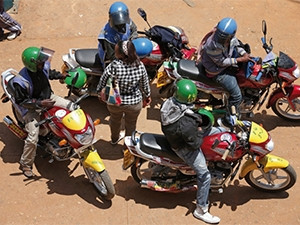
It may sound like a relatively simple thing to be doing, but in parts of East Africa, the ordinary task of taking a taxi home can often be lethal. For many people in countries like Kenya, Rwanda and Uganda, a taxi home means a motorcycle taxi - or 'boda boda' - due to their lower cost and ability to weave through often gridlocked traffic. But these benefits also come with a downside.
Road accidents are the third largest cause of death in Sub-Saharan Africa, with the situation only set to get worse. The danger will outstrip that of HIV/AIDS by 2030. An average of 612 Africans die each day on the roads. A Rwandan motorist is 263 times more likely to die on the road than a motorist in the United States of America.
Much of this carnage is linked to motorcycle taxis. In Uganda, where there are 25 road deaths per 1 000 people, motorcycle taxis are involved in some way in 73 percent of accidents. In Rwanda, the Kigali City Council has estimated they are involved in 80 percent of accidents.
There's an app for that
Traffic accidents are often a lot more serious for motorcycle drivers than car drivers. According to a study conducted at Mulago Hospital in Kampala, 20 percent of all boda accident victims suffer cranial trauma, and half of these patients die from their injuries.
As with many industries, technology is increasingly taking centre stage when it comes to road safety. Startups in East Africa are utilising the power of mobile phones to make the roads safer for drivers and users of motorcycle taxis. One of these is Rwandan startup SafeMotos.
On the face of it, SafeMotos is simply an Uber for motorcycle taxis, allowing users to hail rides with their smartphones. But in the interests of greater safety, the company has applied technology from the vehicle telematics industry, automating its safety features to make sure customers are only picked up by the safest drivers available.
"Right now, when you choose a moto, you gamble with your life," says SafeMotos co-founder Barrett Nash. "You take the first driver on the streets and you have no idea if he's a professional or a 14-year-old boy with a death wish."
SafeMotos takes the gamble out of the process for users. Drivers have smartphones with a gyroscope, an accelerometer and GPS chips, with the company using sensor readings to measure things like rapid acceleration and hard breaking. The numbers are then put through a risk model, which allows it to judge the safety of a particular driver. Bad drivers are pushed to the outskirts of the system, giving customers confidence they are being connected with only the safest drivers on the platform.
Right now, when you choose a moto, you gamble with your life.
Barrett Nash, SafeMotos
The startup was only founded recently, but is seeing traction. It has already raised $85 000 of its targeted $120 000 funding, and plans to expand across Africa from its 'test kitchen' in Rwanda.
"While other companies have looked at motorcycle taxis with an Uber model, no other company has used a software solution to measure driving habits. This makes us uniquely scalable, ready to save lives across the continent," Nash says.
Back to basics
A more manual solution is SafeBoda, a Ugandan startup that has developed a mobile app allowing travellers to call motorcycle taxis via their phones. This again sounds like an Uber-style proposition, but SafeBoda focuses heavily on safety. Drivers and passengers are required to wear bright orange helmets and reflector jackets, with drivers put through First Aid and road safety training before they are accepted on the platform.
SafeBoda calculates that an estimated 800 000 unsafe trips are taken daily, with cofounder Alastair Sussock saying it's not as simple as just supplying helmets. The Injury Control Centre of Uganda reports that 71 percent of boda riders own a helmet, but only 30 percent of drivers and less than one percent of passengers actually wear them.
While motorcycle taxis are popular - 'the lifeblood of many cities in low and middle-income countries', according to Sussock - the whole industry is disorganised and unsafe. By carefully selecting and training the drivers on its platform, SafeBoda blends mobile technology with a safe customer experience.
This article was first published in Brainstorm magazine. Click here to read the complete article at the Brainstorm website.
Share